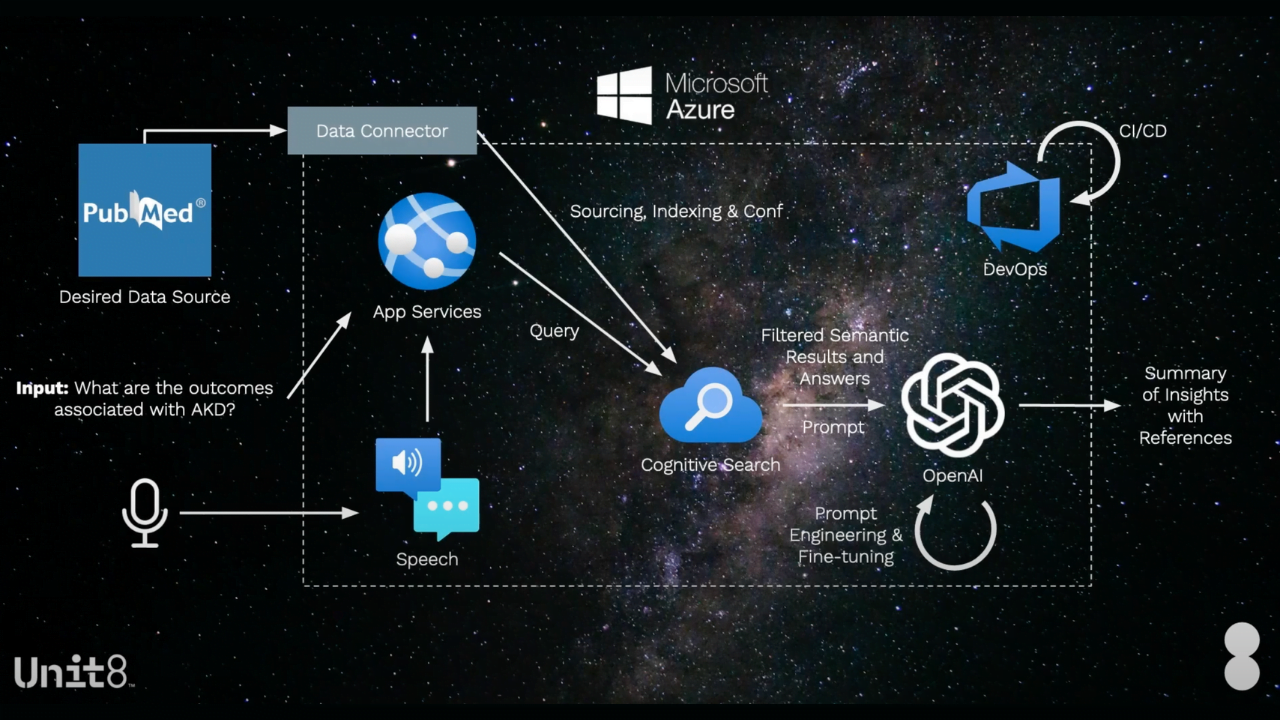
- Apr 3, 2023
- 3 minutes
Introduction
OpenAI has been making waves, with generative models that are capable of absorbing vast amounts of knowledge, faster, more reliably, and are more readily available than previous models. A monumental achievement in AI development indeed. However, the next challenge is to materialise the value of generative models in everyday business activities.
Fortunately, Microsoft has recently announced the integration of OpenAI models in their ecosystem, allowing for the creation of industry-grade applications that can leverage OpenAI offerings. This is a powerful step in enabling businesses to democratize AI throughout their operations.
Generative AI for business - use case
In a recent demo, we showcased an OpenAI Azure Services use case; demonstrating how it can be used to speed up the retrieval of information across vast amounts of unstructured data and summarize key insights to accelerate decision-making. The demo focused on the medical domain, specifically extracting insights and answers from scientific publications. However, any other data source can be attached to the application, whether it’s internal and private or external and public, respecting privacy.
Imagine you’re a medical practitioner, looking for recently published scientific references to learn about the relationship of two diseases, but have very limited time to do so. A tool empowered by Azure Cognitive Search and Azure OpenAI can quickly sift through large amounts of articles, correctly identify the relevant ones, and synthesise concise summaries to extract key findings immediately. It also finds references that potentially contradict the mainstream findings, to provide the practitioner with a wider view. In just a few clicks, summaries can be generated from the abstract of these articles, along with the corresponding reference to that piece of information.
Limitations and how to avoid them?
A major risk to be aware of is so-called “hallucinations”. Essentially, this happens when generative models incorrectly identify information as relevant and/or draw connections between two completely irrelevant pieces of information. When using such models, it is critical to fine-tune the model or its prompt engineering (usually the latter, but in some cases both) to reduce the risk of hallucination. It’s important to note that while the probability of hallucination can be significantly lowered, it cannot be completely eliminated due to the model’s probabilistic nature.
In the aforementioned demo, we did an experiment to restrict the data source to only nephrology-related articles in order to see if the system can behave correctly when the query is out of context. We observed that, after putting proper guardrails, asking a question that is not part of this context (e.g. psychology) results in no answer, which is the proper and expected behavior. This is an important example for businesses trying to integrate OpenAI services into their business: there are ways to limited the source to your desired data, while benefiting from powerful language understanding of OpenAI models like GPT4.
Summary
In conclusion, businesses can significantly benefit from integrating OpenAI Azure Services into their operations. With the ability to extract valuable insights and answers from unstructured data quickly, businesses can make informed decisions and gain a competitive edge in their industry. At Unit8, we specialize in helping businesses leverage the latest AI technologies to achieve their goals. If you’re interested in learning more about how OpenAI Azure Services can benefit your business, please don’t hesitate to get in touch with our team today!


